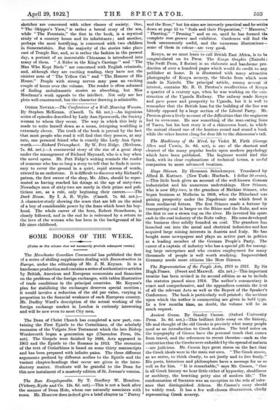OTHER NOVELS.—The Confessions of a Well-Meaning Woman. By Stephen McKenna.
(Cassell. 7s. 6d. net.)—An ingenious series of episodes described by Lady Ann Spenworth, the Society woman to whom they occur. The way in which this lady is made to write herself down as a mean, intriguing worldling is extremely clever. The truth of the book is proved by the fact that most people who read it will find that they possess, at any rate, one personal friend who is exactly like Lady Ann Spen- vrorth.—Riehard Triumphant. By W. Pett Ridge. (Methuen. 7s. 6d. net.)—A commercial story of the rise of a great shop under the management of Richard Maynard, who is a boy when the novel opens. Mr. Pett Ridge's writing reminds the reader of someone who has so long a story to tell that he finds it neces- sary to cover the ground in a quiet, rapid stream of words, uttered in an undertone. It is difficult to discover why Richard's patron, the first owner of the shop, Mr. Allan, should be repre- sented as having reached his dotage at the age of sixty-two. Nowadays men of sixty-two are surely in their prime and poli- ticians are, as a rule, only beginning their careers.—The Dark House. By • I. A. R. Wylie. (CasselL 7s. 6d. net.)— A character-study showing the scars that are left on the mind of a boy of considerable power by the fears which beset his boy- hood. The whole career of the hero, Robert Stonehouse, is closely followed, and in the end he is redeemed by a return to the love of the woman who has been in the background of his life since childhood.


































 Previous page
Previous page